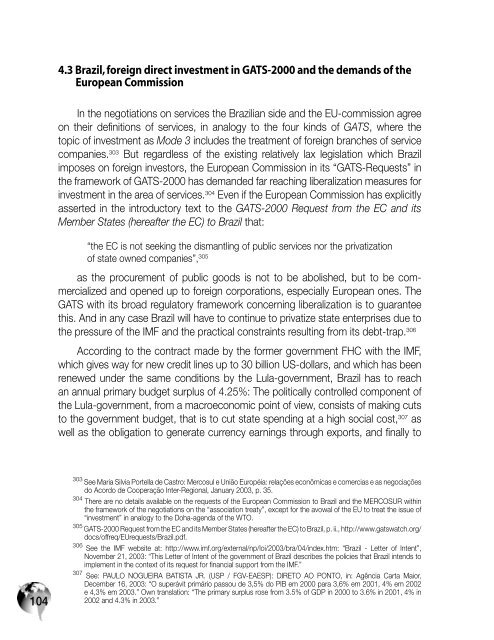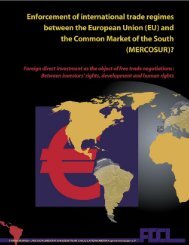(EU) and the Common Market of the South (MERCOSUR)? - FDCL
(EU) and the Common Market of the South (MERCOSUR)? - FDCL
(EU) and the Common Market of the South (MERCOSUR)? - FDCL
You also want an ePaper? Increase the reach of your titles
YUMPU automatically turns print PDFs into web optimized ePapers that Google loves.
104<br />
4.3 Brazil, foreign direct investment in GATS-2000 <strong>and</strong> <strong>the</strong> dem<strong>and</strong>s <strong>of</strong> <strong>the</strong><br />
European Commission<br />
In <strong>the</strong> negotiations on services <strong>the</strong> Brazilian side <strong>and</strong> <strong>the</strong> <strong>EU</strong>-commission agree<br />
on <strong>the</strong>ir definitions <strong>of</strong> services, in analogy to <strong>the</strong> four kinds <strong>of</strong> GATS, where <strong>the</strong><br />
topic <strong>of</strong> investment as Mode 3 includes <strong>the</strong> treatment <strong>of</strong> foreign branches <strong>of</strong> service<br />
companies. 303 But regardless <strong>of</strong> <strong>the</strong> existing relatively lax legislation which Brazil<br />
imposes on foreign investors, <strong>the</strong> European Commission in its “GATS-Requests” in<br />
<strong>the</strong> framework <strong>of</strong> GATS-2000 has dem<strong>and</strong>ed far reaching liberalization measures for<br />
investment in <strong>the</strong> area <strong>of</strong> services. 304 Even if <strong>the</strong> European Commission has explicitly<br />
asserted in <strong>the</strong> introductory text to <strong>the</strong> GATS-2000 Request from <strong>the</strong> EC <strong>and</strong> its<br />
Member States (hereafter <strong>the</strong> EC) to Brazil that:<br />
“<strong>the</strong> EC is not seeking <strong>the</strong> dismantling <strong>of</strong> public services nor <strong>the</strong> privatization<br />
<strong>of</strong> state owned companies”, 305<br />
as <strong>the</strong> procurement <strong>of</strong> public goods is not to be abolished, but to be commercialized<br />
<strong>and</strong> opened up to foreign corporations, especially European ones. The<br />
GATS with its broad regulatory framework concerning liberalization is to guarantee<br />
this. And in any case Brazil will have to continue to privatize state enterprises due to<br />
<strong>the</strong> pressure <strong>of</strong> <strong>the</strong> IMF <strong>and</strong> <strong>the</strong> practical constraints resulting from its debt-trap. 306<br />
According to <strong>the</strong> contract made by <strong>the</strong> former government FHC with <strong>the</strong> IMF,<br />
which gives way for new credit lines up to 30 billion US-dollars, <strong>and</strong> which has been<br />
renewed under <strong>the</strong> same conditions by <strong>the</strong> Lula-government, Brazil has to reach<br />
an annual primary budget surplus <strong>of</strong> 4.25%: The politically controlled component <strong>of</strong><br />
<strong>the</strong> Lula-government, from a macroeconomic point <strong>of</strong> view, consists <strong>of</strong> making cuts<br />
to <strong>the</strong> government budget, that is to cut state spending at a high social cost, 307 as<br />
well as <strong>the</strong> obligation to generate currency earnings through exports, <strong>and</strong> finally to<br />
303 See Maria Silvia Portella de Castro: Mercosul e União Européia: relações econômicas e comercias e as negociações<br />
do Acordo de Cooperação Inter-Regional, January 2003, p. 35.<br />
304 There are no details available on <strong>the</strong> requests <strong>of</strong> <strong>the</strong> European Commission to Brazil <strong>and</strong> <strong>the</strong> <strong>MERCOSUR</strong> within<br />
<strong>the</strong> framework <strong>of</strong> <strong>the</strong> negotiations on <strong>the</strong> “association treaty”, except for <strong>the</strong> avowal <strong>of</strong> <strong>the</strong> <strong>EU</strong> to treat <strong>the</strong> issue <strong>of</strong><br />
“investment” in analogy to <strong>the</strong> Doha-agenda <strong>of</strong> <strong>the</strong> WTO.<br />
305 GATS-2000 Request from <strong>the</strong> EC <strong>and</strong> its Member States (hereafter <strong>the</strong> EC) to Brazil, p. ii., http://www.gatswatch.org/<br />
docs/<strong>of</strong>freq/<strong>EU</strong>requests/Brazil.pdf.<br />
306 See <strong>the</strong> IMF website at: http://www.imf.org/external/np/loi/2003/bra/04/index.htm: “Brazil - Letter <strong>of</strong> Intent”,<br />
November 21, 2003: “This Letter <strong>of</strong> Intent <strong>of</strong> <strong>the</strong> government <strong>of</strong> Brazil describes <strong>the</strong> policies that Brazil intends to<br />
implement in <strong>the</strong> context <strong>of</strong> its request for financial support from <strong>the</strong> IMF.”<br />
307 See: PAULO NOGUEIRA BATISTA JR. (USP / FGV-EAESP): DIRETO AO PONTO, in: Agência Carta Maior,<br />
December 16, 2003: “O superávit primário passou de 3,5% do PIB em 2000 para 3,6% em 2001, 4% em 2002<br />
e 4,3% em 2003.” Own translation: “The primary surplus rose from 3.5% <strong>of</strong> GDP in 2000 to 3.6% in 2001, 4% in<br />
2002 <strong>and</strong> 4.3% in 2003.”









